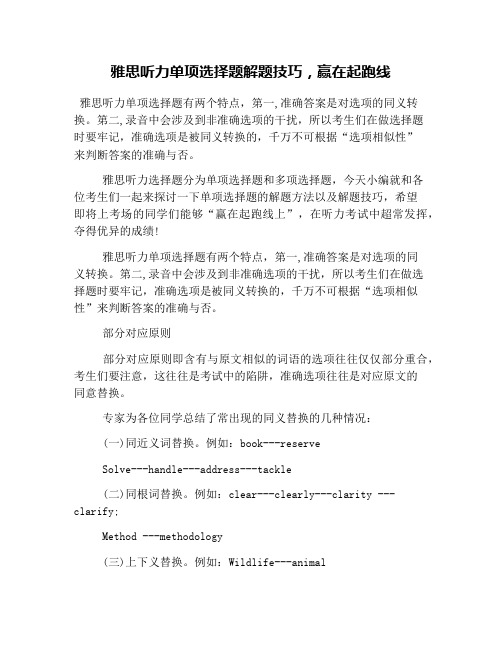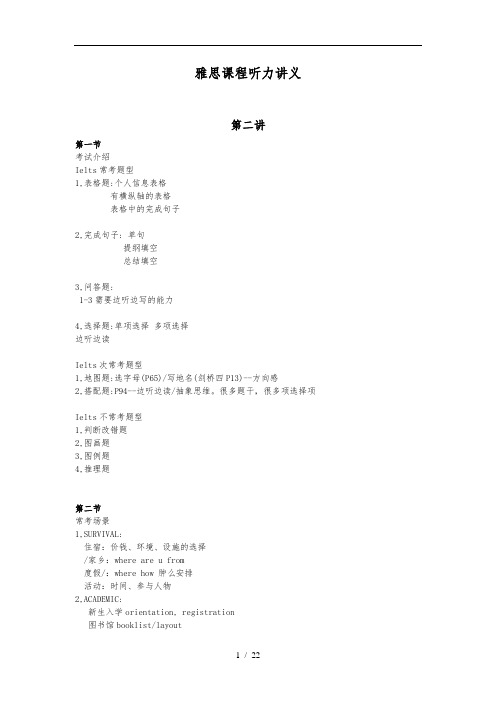雅思听力选择题单项提高直播班--现场班讲义
- 格式:pdf
- 大小:514.37 KB
- 文档页数:37

雅思听力各种题型做题技巧
雅思听力测试分为多种题型,包括单选题、多选题、地图题、填空题、选择合适的选项等。
以下是一些建议的做题技巧:
1. 提前预览题目:在每个听力录音开始之前,快速浏览一遍题目,了解每个问题的要求和关键词,有助于你在听录音时专注于相关内容。
2. 注意关键词:在听录音时,特别注意关键词,他们通常会给出正确答案的线索。
例如,人名、地名、数字、日期等。
3. 注意上下文线索:有时候,答案可能在录音之前或之后提到。
因此,在听录音时,要注意上下文线索,以便更好地理解和回答问题。
4. 多个选择题技巧:多选题要求选择多个选项作为答案。
在听录音时,要注意不同选项之间的差异,并据此做出选择。
5. 听清楚指示词:填空题和选择合适的选项题都需要注意听清楚指示词。
这些词通常是表示并列、递进、转折等关系的连词,如but, however, therefore等。
6. 练习常见题型:将时间花在练习常见的题型上,以提高熟练度和对技巧的掌握。
例如,地图题和填空题在听力测试中经常出现。
7. 制定复习计划:提前安排合理的复习时间,并充分利用模拟
试卷和练习题,以熟悉不同题型的要求和解题技巧。
8. 注意速度和流畅度:雅思听力录音的播放速度通常较快,所以要提前适应快速听的节奏。
平时可以通过听听英语新闻、讲座等提高听力速度和流畅度。
最重要的是,多练习和实践是提高雅思听力成绩的关键。
不断练习和熟悉各种题型,有效地使用上述技巧,相信你的听力水平会有所提高。


雅思听力单项选择题解题技巧,赢在起跑线雅思听力单项选择题有两个特点,第一,准确答案是对选项的同义转换。
第二,录音中会涉及到非准确选项的干扰,所以考生们在做选择题时要牢记,准确选项是被同义转换的,千万不可根据“选项相似性”来判断答案的准确与否。
雅思听力选择题分为单项选择题和多项选择题,今天小编就和各位考生们一起来探讨一下单项选择题的解题方法以及解题技巧,希望即将上考场的同学们能够“赢在起跑线上”,在听力考试中超常发挥,夺得优异的成绩!雅思听力单项选择题有两个特点,第一,准确答案是对选项的同义转换。
第二,录音中会涉及到非准确选项的干扰,所以考生们在做选择题时要牢记,准确选项是被同义转换的,千万不可根据“选项相似性”来判断答案的准确与否。
部分对应原则部分对应原则即含有与原文相似的词语的选项往往仅仅部分重合,考生们要注意,这往往是考试中的陷阱,准确选项往往是对应原文的同意替换。
专家为各位同学总结了常出现的同义替换的几种情况:(一)同近义词替换。
例如:book---reserveSolve---handle---address---tackle(二)同根词替换。
例如:clear---clearly---clarity ---clarify;Method ---methodology(三)上下义替换。
例如:Wildlife---animalVegetation---plant---tree---vegetable(四)数字转换。
例如:Fortnight---14 days---2 weeks25% ---1/4A decade --- 10 yearsA century---100 years并列排除原则在雅思听力中,由并列连接词连接的任何两个选项都不能选,这样的情况下,考生们要选择第三个。
常出现的连词有:and;or;aswell as;Not only…but also…;Neither…nor…;Both… and…客观事实原则考生们在审题时,需注意雅思听力的准确选项一定符合客观事实原则,如遇选项超脱常规,可在审题环节就将其忽略不计。

雅思课程听力讲义第二讲第一节考试介绍Ielts常考题型1,表格题:个人信息表格有横纵轴的表格表格中的完成句子2,完成句子: 单句提纲填空总结填空3,问答题:1-3需要边听边写的能力4,选择题:单项选择多项选择边听边读Ielts次常考题型1,地图题:选字母(P65)/写地名(剑桥四P13)--方向感2,搭配题:P94--边听边读/抽象思维。
很多题干,很多项选择项Ielts不常考题型1,判断改错题2,图画题3,图例题4,推理题第二节常考场景1,SURVIVAL:住宿:价钱、环境、设施的选择/家乡:where are u from度假/:where how 肿么安排活动:时间、参与人物2,ACADEMIC:新生入学orientation, registration图书馆booklist/layout上述6个话题一般在S1和S2出现3---作业/研究/选课 assignment data deadline questionnaire compulsory 4---教师讲课galaxy 银河Peregrine Falcon 游隼kangaroo koalaNeolithic Jurassic Cambrian评分标准13-16=4.5-517-23=5.5-624-30=6.5-731-35=7.5-8TEXT 1SECTION 1 Questions 1-10Question 1-5Compete the form belowWhite only ONE WORD or NUMBER, or TICK (√ ) for each answer.个人信息表格考前须知1,信息修正(听写)标记:分为全部否认和局部否认。
标志词——否认.no not avoid hate dislike unable转折while but however whereas on the other hand nevertheless改 change amendment a second thought2,速度陷阱:答案局部语速较快、轻读。

生活需要游戏,但不能游戏人生;生活需要歌舞,但不需醉生梦死;生活需要艺术,但不能投机取巧;生活需要勇气,但不能鲁莽蛮干;生活需要重复,但不能重蹈覆辙。
-----无名雅思听力精讲班材料I 雅思听力答题程序1.浏览指令:以题目为线索,对即将听到的内容有大体了解,甚至可以推测出部分答案内容。
在磁带开始后有的放矢的寻找答案。
2.分析问题,确定信号词a.确认每道题的题眼和题干,知道问什么,并有哪些预示答案的信号。
有了这种准备,听的时候就能敏锐的觉察到信号的到来,迅速捕捉到所需的答案信息。
b.预测答案类别,可能是日期、人名、数字,或某种原因。
c.通过考虑每一部分的所有问题,理顺问题或信号词的逻辑关系,就能正确预测所听语篇的内容结构和应解决的主要问题。
d.试题每一部分的前后各有30秒,最好把上一部分的30秒用在下一部分的预测上。
3.善于做标记: 采取自己熟悉的方式或标记,快速准确地记录题目选项中的重要信息。
4.综合利用各种信息:听力是一个能动的、积极的思维过程,在听音过程中,要结合自己所掌握的常识、已知的信息、说话人的观点和态度、周围的环境等能动的理解和会意,而不能简单、被动的接受原话。
5.充分利用最后10分钟填写和检查答案。
检查应包括:大写、复数、被动、金钱符号等。
II 雅思听力题型分类1.客观事实题:题目问题以客观事实为依据,如人名、电话号码等,主要以填空题、填表题、完成句子题、图解标签题为主,主要考察对基础知识的快速反应能力和熟练程度,很少涉及归纳总结,难度相对较低。
2.主观归纳题:答案往往是对原文事件进行评述或归纳总结。
匹配题、判断题、简答题、选择题都属于此类。
例如:Attendance at lecture is _______. A. optional after 4 pm B. closely monitoredC. difficult to enforceD. sometimes unnecessary原文:Teacher-Attendance at lectures is necessary, we expect a least 90% attendance at this university.Student-Do they enforce that rule?Teacher-Yes, we do. We are pretty strict about that actually.III 信号词的类别与功能在考试中,一个正确答案出现之前,总会有相关词汇直接或间接的暗示答案在文中的位置,我们把这种暗示答案位置的词汇称为信号词。

听力高分班讲义/ieltswang授课教师:王陆词汇检验生词SECTION 1 Questions 1-10Questions 1-4Complete the form below.Write NO MORE THAN THREE WORDS AND/OR NUMBERS for each answer.Questions 5-7Choose the correct letter, A, B or C.5. Sara requires aA. single room.B. twin room.C. triple room.6. She would prefer to live with aA. family.B. single person.C. couple.7. She would like to live in aA. flat.B. h ouse.C. studio apartment.Questions 8-10Complete the sentences below.Write NO MORE THAN ONE WORD for each answer.8.The ______________ will be $320.9.She needs to pay the rent by cash or cheque on a ______________ basis.10. She needs to pay her part of the ______________ bill.SECTION 2 Questions 11-20Questions 11-14Choose the correct letter, A, B or C.11. When is this year’s festival being held?A. 1-13 JanuaryB. 5-17 JanuaryC. 25-31 January12. What will the reviewer concentrate on today?A. theatreB. danceC. exhibitions13. How many circuses are there in the festival?A. oneB. twoC. several14. Where does Circus Romano perform?A. in a theatreB. in a tentC. in a stadium Questions 15-20Complete the notes below.Write NO MORE THAN THREE WORDS for each answer.SECTION 3 Questions 21-30 Questions 21-25Choose the correct letter, A, B or C.21. The man wants information on courses forA. people going back to college.B. postgraduate students.C. business executives.22. The 'Study for Success' seminar lasts forA. one day.B. two days.C. three days.23. In the seminar the work on writing aims to improveA. confidence.B. speed.C. clarity.24. Reading sessions help students to readA. analytically.B. as fast as possible.C. thoroughly.25. The seminar tries toA. prepare learners physically.B. encourage interest in learning.C. develop literacy skills.Questions 26-30Choose the correct letter, A, B or C.26. A key component of the course is learning how toA. use time effectively.B. stay healthy.C. select appropriate materials.27. Students who want to do the 'Study for Success' seminar shouldA. register with the Faculty Office.B. contact their Course Convenor.C. reserve a place in advance.28. The 'Learning Skills for University Study" course takes place onA. Monday, Wednesday and Friday.B. Monday, Tuesday and Wednesday.C. Monday, Thursday and Friday.29. A feature of this course isA. a physical training component.B. advice on coping with stress.C. a detailed weekly planner.30 . The man chooses the 'Study for Success' seminar becauseA. he is over forty.B. he wants to start at the beginning.C. he seeks to revise his skills.SECTION 4 Questions 31-40Questions 31 and 32Complete the notes below.Write NO MORE THAN TWO WORDS AND/OR A NUMBER for each answer.Questions 33-37Complete the table below.Write NO MORE THAN THREE WORDS for each answer.Question 38Choose TWO letters A-G.Which TWO facilities did the students request in the new Union building?A. a libraryB. a games roomC. a student health centreD. a mini fitness centreE. a large swimming poolF. a travel agencyG. a lecture theatreQuestion 39Choose the correct letter, A, B or C.Which argument was used AGAINST having a drama theatre?A. It would be expensive and no students would use it.B. It would be a poor use of resources because only a minority would use it.C. It could not accommodate large productions of plays.Question 40Choose TWO letters A-E.Which TWO security measures have been requested?A. closed-circuit TVB. show Union Card on entering the buildingC. show Union Card when askedD. spot searches of bagsE. permanent Security Office on siteSECTION 4I hope that this first session, which I’ve called An Introduction to British Agriculture, will providea helpful background to the farm visits you’ll be doing next week.I think I should start by emphasizing that agriculture still accounts for a very important part of this country’s economy. We are used to hearing the UK’s society and economy described as being ‘industrial’ or even ‘post-industrial’, but we mustn’t let this blind us to the fact that agriculture are its supporting industries still account for around 20% of our Gross National Product.This figure is especially impressive, I think, when you bear in mind how very small a percentage of the UK workforce is employed in agriculture. This is not a recent development – you would have to go back to 1750 or so to find a majority of the workforce in this Country working in agriculture. By the middle of the next century, in 1850 that is, it had fallen sharply to 10%, and then to 3% by the middle of the twentieth century.And now just 2% of the workforce contribute 20% of GNP. How is this efficiency achieved? Well, my own view is that it owes a great deal to a history, over the last 50 or 60 years, of intelligent support by the state, mainly taking the form of helping farmers to plan ahead. Then the two other factors I should mention, both very important, are the high level of training amongst the agricultural workforce. And secondly, the recognition by farmers of the value of investing in technology.Now, although the UK is a fairly small country, the geology and climate vary a good deal from region to region. For our purposes today we can divide the country broadly into three –I’ve marked them on the map here (indicates map).The region you’ll get to know best, of course, is the north, where we are at present. The land here is generally hilly, and the soils thin. The climate up here, and you’ve already had evidence of this, is generally cool and wet. As you will see next week, the typical farm here in the North is a small, family-run concern, producing mainly wool and timber for the market.If we contrast that with the Eastern region, over here, the east is flatter and more low-lying, with fertile soils and a mixed climate. Average farm-size is much bigger in the east, and farms are likely to be managed strictly on commercial lines. As for crops, well, the east is the UK’s great cereal-producing region. However, increasingly significant areas are now also given over to high quality vegetables for supply direct to the supermarkets.The third broad region is the west, where it’s a different story again. The climate is warmer than in the north and much wetter than in the east. The resulting rich soils in the west provide excellent pasture, and the farms there are quite large, typically around 800 hectares. The main products are milk, cheese and meat.So, clearly, there are marked differences between regions. But this does not prevent quite a strong sense of solidarity amongst the farming community as a whole, right across the country. This solidarity comes in part from the need to present a united front in dealing with other powerful interest-groups, such as government or the media. It also owes something to the close co-operation between all the agricultural training colleges, through which the great majority of farmers pass at the beginning of their careers. And a third factor making for solidarity is the national structure of the Farmers’ Union, of which virtually all farmers are members.Finally in this short talk, I would like to say a little about the challenges facing farmers in the next …场景机经图书馆I got the grade of (A plus) in my previous studies.Dina didn‟t attend the lecture because (It was cancelled )Dina advised against? a book by JespersonOnce entering the library, you need to register your name and (departmental/parental address)Students may make use of recall system and(a pink slip)(注:这里pink slip 指代书板)if you want to hand books or make inquiries, you may go to the (information desk)Students will be fined 违反规定需要罚款(25 pence)if they violate the rules.用图书馆的目的make (summaries)(另有答案填:essay plans / advice to essay)写essay 要列出(documents)documental …..exchange draft and (get/give feedbacks)(王陆提醒大家注意复数形式)录制录像21. People include : ……, ………, and ( students)22.Title: (A College Tour)23. 分工:(designer & writer)24. 下一次讨论的时间:Thursday25-26. 拍摄内容:(city overhead view)城市鸟瞰, (college close-up)校园特写27.Interviewee(采访对象): (teacher)28—30.选择:为什么采访普通教师不采访校长?28.第一个原因是选:C hard to approach (注意:校长难以接近)29.第二个是因为季节关系,影响作品质量,选:C quality30.第三个是想做成何种形式?选:B clear & informative (知识性的)学习The importance of study is not in exams; the most important is to:21.(enjoy your courses)22.(learn well)23. 考试之前要做好plan,需提前(6 weeks)24. 还要revision 要求:(immediately and regularly)25. 制定plan 要考虑到emergencies 和(breaks)的时间26. 若24 小时不复习,那所学的东西将忘记(80%)(数字先有个学生大概说了60%,是陷阱,后来老师说是80%)27-28 cramming the test (填鸭式的复习)的坏处是造成:27. (added panic)和28. (lack of sleep)29 科技课程中还包括:(biology) 新题目是:Review topic and decide on (order/priority)30 持续学习多久人就会累?(75 minutes)Section 321—24) Gap Filling:21. Occupation (cashier)22. How much to spend per week shopping (50 pounds),23. Where often go(big department store)24. What is difficult to buy (jeans)25—27)是一个圆形图, 反映消费的三种方式:25. 50%的人每月消费(45镑)26. 15%的人每月花(75镑)25. 35%的人每月花(20镑)28—30)填空:28.29.30.集体反映什么最难买(books, sportswear, trousers)Section 321--22选择题(三选一):21.来自9.7王陆老师03101的回忆:Kira chose the course because she 选:Bpleted her course in her home countryB.took 2-year course in her home countryC.wanted to study it原来的V29原题为:21. In her country Kira had: 选:BA.found her course difficultB.done 2 years for a courseC.complete a course22. 来自9.7王陆老师03101的回忆:In order to be successful in her study, Kira should 选CA. write fasterB. read fasterC.change her way of thinking (critical)原来的V29原题为:22. To succeed with assignment Kira had to: 选:AA. chang her way of thinking (这次王陆老师给大家统一了答案:)B. read fasterC.write faster23—25)填空完成句子题:Kira says that lectures are easier to 23. (approach) than in her home country.Paul suggest that Kira may be more 24. (familiar) than when she was studying before.Kira says that students want to discuss things that 25.(interest) them very much.26—30) 简答题(NO MORE THAN 3 WORDS):26. How did the students do their practical session?(与王陆老师的回忆一致)( in small groups)27. In the second semester how often did Kira work in a hospital? (every second day)28. How much full-time work did Kira do during the year? (2 weeks )29. Having completed the year, what did Kira feel? (much more confident)30. In addition to the language, what do overseas students need to?(the education system)Section 3全是选择题21. Where have three students been to? 选:A the same lectureA the same lectureB the different lecturesC Coffee22. What is Jane‟s problem ? 选:want to write down too much(Jane's difficulty to take down everything is Jane always attempts to write down too many things)23. Ian has the same problem?: 选borrow notes from his friends(Ian 也不行Ian always borrows other's notes /borrows notes from friends)24. Sally 是记笔记高手所以Ian问她对用recorder把lecture 的内容录下来回去再听整理笔记有何看法recording tape is?选:waste of time25. 接着她开始介绍经验要用活页本, 不能像Jane 那样, 而Jane用什么记笔记? 选B. spiral notebook26. 回去以后她会立即复习选:C.review promptly27. Sally说同时要taking headings, to help to review便于复习考试28. According to Ian, how can he emphasize? 选: repetition29. Where to take notes?选: margin or overhead30. Sally说要用abbreviationSally said that选: abbreviation is the best way to space out for saving timeSection 321-- 23)填空题:21. (Teacher)22. Students have (5)minutes to ask questions.23. The presentation won‟t be(assessed)24—27)搭配题Matching:A. 肯定will do in presentationB. 可能may do in presentationC. 不会will not do in presentation24. Geographic Location ――A.25. Economics――B.26. Education History--A.27. Language――C.28—30)图表题Table:3选1:21. Hiroko说那个topic他上次已作过一次presentation,显然选: He was not nervous about it.22. Spiro说其他人很奇怪, they just read out their notes,没新意. 她的作法应该是比他们要interesting一点,选: interesting23. What did Hiroko feel about his presentation? 选:BA. he is not confident (显然不对,他已有经验了,He was not nervous)B. he is unsatisfied(原文说“he feels no sense of satisfaction.”)C. he feels no sense of relief.24. What did Spiro feel about her presentation? 文中说其他人热烈讨论把她甩在一边.选:C. She found others know each other well. (她跟其他人不熟,所以她很难介入discussion。
雅思听力真经讲义贵学教育李慧芳雅思听力破冰之旅●听力六大障碍1. 常见核心词汇(experimental design, facilities)2. 考点词(不同section中都会考到的单词animal-wildlife)3. 词组(听力中听懂,口语中也可以应用)4. 常见动词的不规则形式5. 多义词(issue 在图书馆场景中是期刊号)6. 场景●雅思听力考试的四大难点1. 考点词汇熟悉敏感度差2. 听不到关键词3. 多数情况会受到答案位置干扰信息的影响4. 选择题不能很好的从头跟到尾●How to solve the problems?⏹难点一解决方案雅思听力考点词1700-1800认真做听力机经考点词汇的听写,克服音生,拼生和纯生的现象音生:见到认识,也会拼写,但是对于发音没有任何感觉,此类词汇属于阅读和写作词汇,不是听力的有效词汇(建议做跟读)拼生:能够听到答案,但是不能准确拼写。
(建议做听写练习)纯生:此类词属于完全陌生的词汇(强化听写练习)⏹难点二解决方案关键词划好了但是却听不到(出现了不熟悉的替换)听力考试一大难点:题干和选项都有可能出现替换1. 题干的关键词替换听不出来就不能确定答案的位置,因此会错失答案。
2. 选项的替换是选择题考察的主要方面。
建议:在做题的时候总结替换规律,熟悉的替换词越多,失分的可能性越小⏹难点三解决方案多数情况下受到答案处干扰信息的影响:1. 审题过程中找题点(题点: 听力考试三大考点, 替换词, 同根词)2. 三角法则:关键词+语气定位+替换语气定位?(听力中要注意:并列结构, 强调, 重复, 否定, 序数词, 同根词, 笑声,重读)⏹难点四解决方案如何更好地follow 一个topic ?1. 要有全局意识2. 听力的导向性词汇●听力考试三大考点时间,数字,数量多少⏹时间考点题干中出现表时间或暗示时间的词,此处为考点,同时为干扰所在1. 过去,现在,将来2. 各种具体表示时间的词(时间表时间,时态表时间)◆审题Notes on sports clubFacilities available: Golf12Classes available: ·Kick-boxing·3Additional facility: 4 (restaurant opening soon) 空1,2和Golf为并列关系。